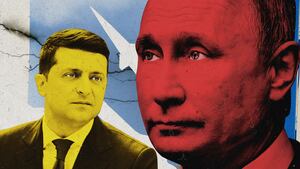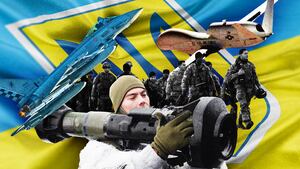China is about to make a big mistake.
Faced with the choice between playing a constructive role in helping to resolve the Ukraine crisis, or helping support Russia’s brutal attack on that country, China seems committed to a course that could plunge the world into a new Cold War.
On Monday, US officials led by National Security Advisor Jake Sullivan met in Rome with a Chinese delegation led by his counterpart, Yang Jiechi. While a central topic of the seven hour-long discussion was Ukraine, the meeting covered a wide range of topics including North Korea, Taiwan, and on-going efforts to manage strategic risks confronting the two nations.
A source familiar with what transpired in the meeting told me that their sense was that “the Chinese at the highest levels have thrown in with Putin” and that Chinese President Xi Jinping is “trying to play it neutral in public but back Putin substantially in the background—economically, financially, and now perhaps militarily. I don’t think they want to play a mediation role.”
The source added, “I sense substantial distrust and not much upward promise at this time. U.S. officials told them that if China continues on its path with Russia it will be one of the most consequential turning points in modern history.”
As Sullivan said on Sunday during a CNN interview, the U.S. is watching to see whether China actually “does provide any form of support, material support or economic support, to Russia.” Sullivan added that “we have communicated to Beijing that we will not stand by and allow any country to compensate Russia for its losses from the economic sanctions.”
During the past several weeks, U.S. officials were uncertain about how closely associated Beijing wished to be with the Russian invasion.
On the one hand, prior to the invasion Vladimir Putin met with Xi and the two leaders framed the relationship as one of deep friendship (most prominently during the opening ceremonies of the Beijing Winter Olympics). More recently, Chinese state media has amplified Russian propaganda—including the unfounded stories circulating among MAGA-friendly media that the U.S. was operating bioweapons facilities in Ukraine.
But on the other hand, China might be unpleasantly surprised by how Putin’s invasion of Ukraine has gone thus far. CIA Director William Burns told the Senate Intelligence Committee last week that Xi “is unsettled by what he is seeing, partly because his own intelligence doesn’t appear to have told him what was going to happen.” Burns went on to say, perhaps prophetically, that the Chinese were concerned with the “reputational damage that could come from” the country’s association with a conflict that has been condemned by the vast majority of nations of the world.
According to a senior administration official, Sullivan emphasized to the Chinese delegation the unity of the U.S. and its European partners, at least when it comes to Ukraine. He also underscored the engagement of America’s Asia-Pacific allies in the sanctions program targeting Russia, and made it known that Ukraine was a core topic of discussion at the recent virtual summit of the Quad countries (the U.S., Japan, Australia and India), in which President Joe Biden participated.
Biden administration officials had harbored hopes that China’s concerns about Russia’s conduct in Ukraine might create an opening for China to either influence Russia to alter its conduct or, perhaps, even to act as an interlocutor in helping to bring the conflict to a conclusion.
Xi and other top Chinese officials have in the past indicated a desire for China to be acknowledged as a leader within the international community. But by throwing its lot in with Putin—already a global pariah who each day compounds past war crimes with new ones—the Chinese leadership not only risks the status it seeks, but is making three other grave errors.
That’s because as the war continues, Russia’s international standing will not only suffer, it will be weakened economically and militarily. As a result, China’s partnership with that country has to be seen as a wasting asset—less valuable to China with each passing day.
By the same token, if China is seen as providing military aid to Russia or helping Russia evade international sanctions, China will be putting its own economy at risk because it, too, will become the target of U.S.-led Western sanctions.
Finally, by choosing to support the indefensible invasion of a peaceful nation in violation of international law, China is pitting itself not only against the international order, but against the U.S. and its allies.
This would push the potential “new” Cold War between China and the U.S. closer to a reality. It will also frame the conflict as one between a China-Russia alliance in opposition to the U.S. and allies on both sides of the globe.
It would be a tragic irony for China. After decades of remarkable economic development, on the verge of claiming a leading role in helping to define the future for the entire planet, they have put all that in jeopardy to ally themselves to a man, Vladimir Putin, who is desperately clinging to a long lost, unlamented past.







